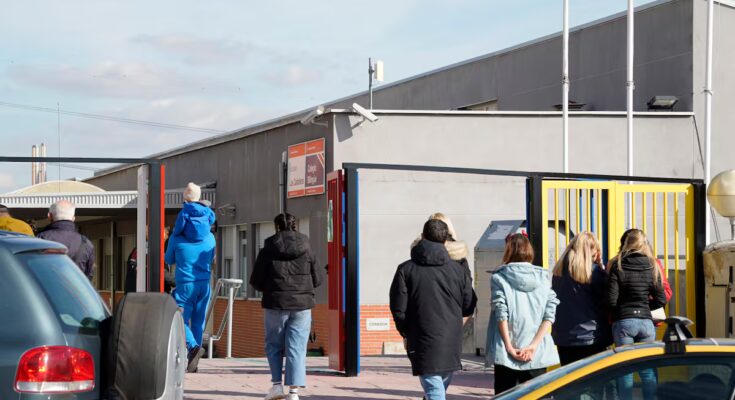Pressure from the far right is leading the PP to eliminate from schools an Arabic language and Moroccan culture program launched in 2012 by the government of the popular Mariano Rajoy, in which almost 8,000 students in 400 educational centers participated last year. Murcia and Madrid abolished it this year and other Popular Party communities are considering doing so. In Catalonia, where its elimination is not on the table, the government has asked the Ministry of Education to hide the list of centers participating in the program due to threatening accusations by the ultras against some of them. This is what the Government did, emptying of its contents the page that allowed you to consult the list of centers throughout Spain.
Fátima (who asks that her real name not be published), whose two children studied the program in a school in Murcia, says: “It helped them learn the language and identity of their families. It was good for their integration. And it also served as a link between families and the school. We ask for the program to return, because our children need it.”
The current program was created in 2012 through an agreement signed by the then Spanish Foreign Minister, José Manuel García-Margallo, and his Moroccan counterpart to mutually facilitate knowledge of the culture of the neighboring country, “convinced”, we read in the international agreement published by the BOE, “that mutual understanding and cooperation for peace and stability in their regions constitute the appropriate way to achieve the objectives of progress and development of their peoples”. The agreement provides different ways to achieve each country’s goal of spreading “its language and cultural heritage” to its neighbor. Spain has decided to strengthen its network of schools in Morocco, where it has 11, dependent on the Spanish embassy in the country, in which around 5,000 students study, around half of them Spanish citizens.
In Spain, however, where the school population of immigrant origin (last year there were 197,099 students of Moroccan nationality in the pre-university phases in Spain) is basically enrolled in public schools, the agreement has materialized in the Arabic language and Moroccan culture program which the far right has now targeted.
Lessons are normally offered as an extracurricular activity, in the afternoon, in public centers that request it, although in some territories, such as Catalonia, it is possible to choose it as an optional subject in ESO, from a wide range of subjects, which include other languages such as German, French or Italian. The course has no cost for the center, the families, the autonomous communities, or even for the State, since the salaries of the teachers, Moroccan public employees, are paid by the neighboring country through the Hassan II Foundation for Moroccans residing abroad. Most of the students who attend are of Moroccan origin or from other Arabic-speaking countries, but children of other origins and natives who are interested (or their families are interested) in learning the language also enroll.
Half a dozen school directors from different autonomous communities consulted by this newspaper agree that the program has not generated controversy in their centers. Nor, despite the messages spread online by the far right, does it have religious connotations, beyond those that can be gleaned by explaining, for example, holidays that have a root of that type, as happens in Spain with Christmas or Easter, they underline. In addition to facilitating the learning of Arabic and helping children of Maghrebi origin learn about their culture, teachers in the program often act as mediators between their families and the school or institute. «It is a good resource for the centre, much requested by families, especially Moroccan ones», summarizes a director from Seville.
Last year it was offered in almost 400 schools and institutes in 12 autonomous communities. Figures which after the cancellation in Madrid and Murcia were reduced to 320 schools and institutes in 10 territories, Andalusia, Aragon, the Balearic Islands, the Canary Islands, Catalonia, Castile-La Mancha, Extremadura, Galicia, La Rioja and the Basque Country. And their number could continue to decline, warn sources from the Ministry of Education.
Aragon
Unofficially, technicians working on the program in the autonomous communities governed by the PP have informed the ministry that suppression is being considered in their ministries. In some cases, such as in the Canary Islands, where the PP holds the Education portfolio as a minority partner in a regional executive chaired by the Canary Coalition, cancellation appears to have been ruled out. In others, such as Aragon, the program seems much more threatened, Ministry sources admit. A few days ago, Aragon’s education minister, Tomasa Hernández, appeared to support the program at the request of a Vox deputy in the regional parliament. But, specifically asked by EL PAÍS this Wednesday, a spokesperson for the Department of Education of Aragon avoided clarifying whether they intend to maintain it. Ministry sources fear that, as well as in the rest of the territories where the PP depends this legislature on Vox’s votes to approve laws and budgets, depending on the electoral results of the next regional elections scheduled in Extremadura (on December 21) and Andalusia (in 2026), the suppression of the program could be one of the conditions that Vox places on the PP in exchange for its support to allow it to form a government. The party has already imposed it as a requirement in Murcia to approve this year’s budgets.
The ministry sources themselves express their amazement at the drift of the PP in this area, taking into account that they were the ones who launched it, it has no cost for the autonomous communities and is optional for educational centres. They are the ones who, based on the profile of their students, decide to offer it. So the only explanation they can find in the ministry is that the party allows itself to be carried away by the Islamophobia of the far right.
In Murcia, the Minister of Education, Víctor Marín, of the PP, hypothesized at the beginning of the course that the suppression was due to the budget agreement signed with Vox. Formally asking the ministry for cancellation, he also argued that its scope was “very minority” (even though around 350 students from eight schools benefited), according to a document to which this newspaper had access. Madrid, where its reach was much broader (it was taught in 70 schools), justified the program’s elimination, announced in the summer, by citing a lack of information about the program and control over the teacher selection process. Ministry sources assure, for their part, that the Madrid Executive has not officially expressed this concern. Weeks before announcing the cancellation, Madrid had confirmed, during the annual meeting to manage the programme, its participation in this course, specifying the number of teachers it needed. As in other communities, Vox had called for their suppression months earlier in the Madrid Assembly, claiming that the classes were part “of a plan to conquer” Spain. The ministry admits that it is working with Morocco to improve the teacher selection process.
In Catalonia, in addition to Vox, another ultra party, Aliança Catalana, has targeted the program, reporting the educational centers where it is taught. AND influencers Right-wing extremists have for months been propagating a narrative that falsely implies that tuition is paid for by citizens’ taxes at the expense of the teachers native-born students need. The pressure received from some centers led the Generalitat to ask the Ministry of Education to no longer show the list of schools and institutes where it is offered, which the Government has done with those throughout Spain.


